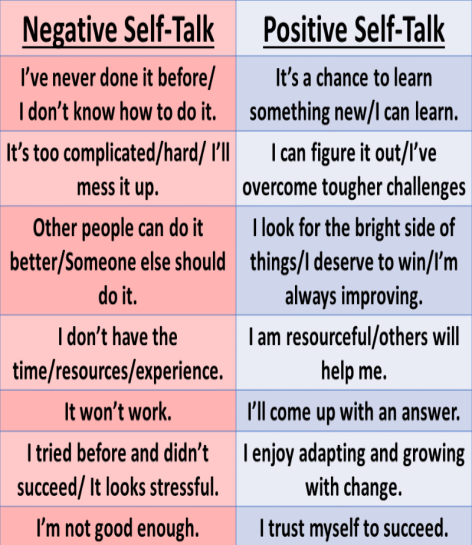What does DBT stand for?
What is dialectical behavioral therapy?
True of False:
Mindfulness can improve memory, processing speed, and emotional awareness.
True!
This increase in emotional awareness can help you make better decisions and better understand yourself.
True or False: Incorporating positive self-talk is a practice based in gratitude, mindfulness, & dialectics.
True!
We start experiencing automatic negative thoughts arounds 7-years-old!
Examples: 
Pain + Non-acceptance = ?
Suffering
Radical acceptance decreases suffering
True or False:
"You never do the dishes, you're so lazy!" is an effective way for your parent to get you to do your chores.
False.
Double points if you can give an I-statement that will be ~more~ effective.
Name the modules of DBT
What are: Mindfulness, Distress Tolerance, Emotional Regulation, and Interpersonal Effectiveness
What is mindfulness?
State of non-judgmental awareness of what's happening in the present moment.
Share how you would self-sooth with the five senses.
Sight
Smell
Touch
Hear
Taste
True or False:
Radical acceptance = Approval of what happened
False
Radically accepting a past trauma does not mean you are glad it happened. It is simply letting go so you can move on with your life.
You can radically accept that something affects you but also work to change it. That’s a dialectic!
GIVE is an acronym for effective interpersonal communication. What does it stand for?
(be) Gentle
Interested
Validate
Easy Manner
Define dialectical thinking
What is the ability to view issues from multiple or opposite perspectives and to acknowledge both can be true.
The focus in DBT is on an integration of acceptance and change.
What is "Wise Mind"?
Intuition
or
When emotional mind and rational mind work together effectively
Name three emotions that can be hard to regulate and share the physical/psychological effects that let you know how you're feeling.
Emotion examples: anger, stress, grief, disgust, fear
Somatic feelings examples: racing thoughts, increased heart rate, sweaty palms, crying, dissociating, stomach pain, restlessness
You've learned how to change your body chemistry when overwhelmed/distressed. This potentially crisis-level intervention is an acronym: TIPP. What does it stand for?
Temperature change
Intense exercise
Paced breathing
Paired muscle relaxation
Name the acronym for the interpersonal effectiveness skill that prioritizes: your own values, fairness, not apologizing when you feel you shouldn't, & being truthful when navigating conflict with others.
What is the FAST skill?
Fairness
Apologizing (not)
Stick to your values
Truth
Self-care is the time you take to prioritize yourself across many areas of health and wellness. Name one coping skill for each of the following categories:
physical, psychological, emotional, spiritual, academic, & personal - wellness.
Physical: 7-8 hours of sleep, take a walk, play a sport
Psychological: therapy, journaling, de-cluttering
Emotional: positive affirmations, gratitude, laughing
Spiritual: forgiveness, time in nature, value exploration
Academic/professional: find your passions, read, take breaks
Personal: set goals, listen to music, unplug from tech
Urge Surfing is a tool related to mindfulness and distress tolerance. What are the four parts of the "wave"?
Double points: give an example and explain how you would use the strategy.
Trigger
Build up
Peak
Fall
ABC PLEASE is broken up into three DBT groups at Edgewood.
How does (A)ccumulating positive experiences and (B)uilding mastery help us with emotional regulation?
Intentionally adding many small positive experiences into your average day will automatically make even a "bad day" a little better. (i.e.-snuggling a pet, spending time with good friends, doing something for fun).
Doing things that make you feel effective & competent decrease feelings of hopelessness & helplessness.
When folks are distressed, it may seem impossible to overcome. The acronym ACCEPTS offers seven techniques to manage distress, what are they?
Activities- read a book, write in a journal
Contributions- volunteer, ask a friend about their day
Comparison- reflect on times you've been through something similar and how you made it through
Emotion (Use Opposite)- Sad? Watch a happy movie.
Push Away- use imagery or time blocks to push away negative thoughts/urges
Thoughts- use a mental strategy or activity to shift your thoughts back to neutral (singing, 54321 grounding, etc)
Sensations- safe physical distraction like holding an ice cube, eating spicy food, or taking a cold shower)
DEAR MAN is an acronym tool to communicate more effectively, what does it stand for?
Double points: give an example and explain how you would use the strategy.
Describe
Express
Assert
Reinforce
Mindfulness
Appear confident
Negotiate
Name the when, who, and why of founding DBT treatment.
Who is Marsha Linehan in 1993 as a treatment for personality disorders?
Double point extra credit if you acknowledged the influence of Eastern religious & philosophical traditions
Name and/or describe four common cognitive distortions.
- All or nothing thinking or black & white thinking
- Should statements
- Overgeneralizing
- Mental filter
- Disqualifying the positive
- Jumping to conclusions (fortune telling)
- Catastrophizing or minimizing
- Emotional reasoning
- Personalizing
ABC PLEASE is broken up into three groups at Edgewood.
How does PLEASE help with emotional regulation?
Double points if you can correctly identify 4/5 of the words in the acronym.
PLEASE makes sure we are taking care of our bodies and meeting our basic needs which are foundational to our overall wellness. It's so much harder to regulate our emotions if we don't feel well, we're starving, or exhausted.
PhysicaL illness (treat)
Eating (regular/balanced)
Avoid recreational drugs
Sleep
Exercise regularly
IMPROVE is a acronym-based framework that, used regularly, will help individuals build a life that increases distress tolerance.
What does it stand for? Give 5 out of 7 for full points.
Imagery
Meaning
Pause
Relaxation
One thing at a time
Vacation
Encourage yourself
We helped you turn decision making into a game where a series of yes or no questions helped you weigh two options. What is the game called?
What is the dime game?